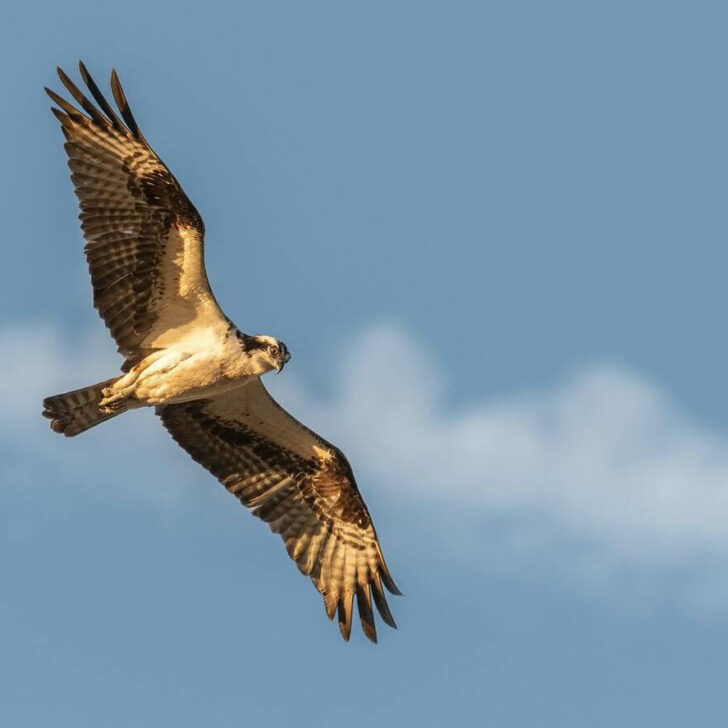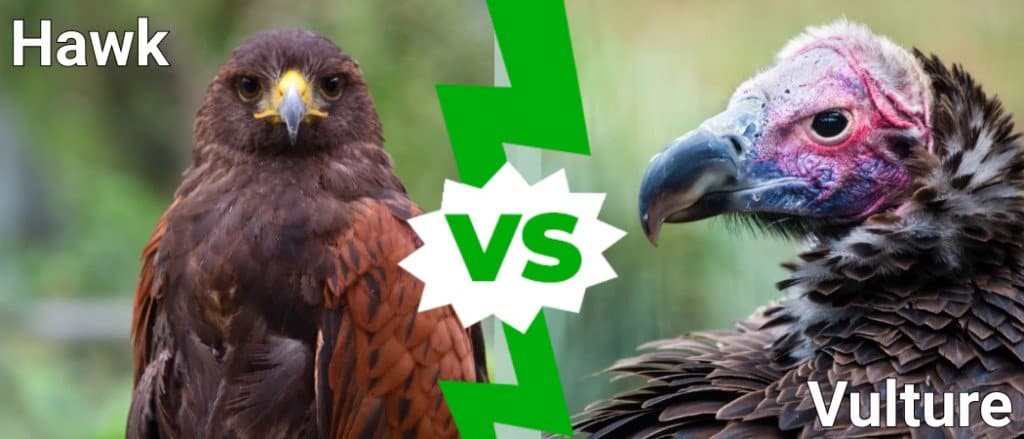I was recently hiking in the mountains when I came across a sight that made my heart skip a beat. A majestic hawk soared high above me, its sharp eyes scanning the ground for prey. But then, I noticed something else out of the corner of my eye. A vulture, with its distinctive bald head and massive wingspan, was circling slowly below, seemingly unfazed by the hawk’s presence. I found myself wondering about the relationship between these two formidable birds. How do they differ, how are they similar, and what exactly are their roles in the ecosystem?

Image: allthedifferences.com
These are questions that have intrigued scientists and bird enthusiasts alike for centuries. While both vultures and hawks are birds of prey, they occupy different ecological niches and have vastly different hunting strategies. This article delves into the fascinating world of these aerial hunters, exploring their unique characteristics, behaviors, and the roles they play in the delicate balance of nature.
Understanding the Differences: Vulture vs Hawk
Dietary Habits: Scavengers vs Hunters
One of the most significant distinctions between vultures and hawks lies in their dietary preferences. Vultures are primarily scavengers, relying on carrion – the dead flesh of animals – as their primary food source. These opportunistic feeders play a crucial role in keeping ecosystems clean by consuming decaying carcasses, preventing the spread of disease and returning nutrients to the environment.
In contrast, hawks are active hunters, relying on their keen eyesight and sharp talons to capture live prey. Their diet varies depending on the species, but generally includes small mammals, birds, reptiles, and amphibians. These fierce predators exemplify the “survival of the fittest” principle, showcasing remarkable hunting prowess and adaptability.
Physical Adaptations: Built for Different Purposes
The distinct dietary habits of vultures and hawks are reflected in their unique physical adaptations. Vultures have a powerful beak, ideal for tearing flesh and a strong stomach that can digest even the toughest bones and hides. Their large wingspan and powerful flight muscles allow them to soar for long periods, searching for carrion over vast distances. They also have a strong sense of smell, helping them locate rotting carcasses even when covered by vegetation.
Hawks, on the other hand, are built for speed and agility. They possess sharp talons to subdue and kill prey and a strong beak to tear flesh. Their excellent eyesight allows them to spot potential prey from great heights, and they are incredibly maneuverable in flight, capable of executing sharp turns and dives to capture their quarry. Hawks also have a distinctive hooked beak, perfect for tearing the flesh of their victims.

Image: a-z-animals.com
Social Behavior: Solitary vs Cooperative
Social behaviors also differ significantly between vultures and hawks. Vultures are generally solitary birds, although they may gather in large numbers at carcasses. They often display a pecking order, with dominant individuals claiming the best feeding spots. While not inherently aggressive, vultures will fight fiercely over large meals.
Hawks, on the other hand, exhibit a broader range of social behaviors, including solitary hunting, cooperative hunting, and territorial defense. Certain hawk species form pairs for breeding and raising their young, and some engage in cooperative hunting techniques to take down larger prey. Hawks can be fiercely territorial, especially during breeding season, defending their territory against all intruders.
Vulture: The Silent Clean-Up Crew
They act as the silent clean-up crew of the animal kingdom, preventing the spread of disease and assisting in the decomposition process. Without vultures, ecosystems would be overwhelmed with decaying carcasses, posing significant health risks to other animals and humans. The presence of vultures in an ecosystem often serves as an indicator of ecological health, highlighting the vital role they play in the natural balance.
There are many species of vultures, each with its own unique adaptations and habitat preferences. For example, the bald eagle, once considered a vulture due to its scavenging habits, is now recognized as a hawk owing to its hunting prowess. However, the fundamental role of vultures as scavengers remains consistent across all species. They are often referred to as “nature’s garbage disposal,” and their contribution to the ecosystem is far greater than their unsavory appearance might suggest.
Hawk: The Mighty Hunter
Hawks embody the archetype of the fierce and agile predator. They are highly skilled hunters, utilizing their sharp eyesight, powerful flight, and razor-sharp talons to capture a wide variety of prey. Their presence in an ecosystem highlights the delicate balance of predator-prey relationships, playing a vital role in regulating populations and maintaining biodiversity.
One of the most fascinating aspects of hawk hunting behavior is their ability to adapt to different environments and prey types. For instance, a Cooper’s Hawk, a common urban hawk, is known to adapt to its surroundings and hunt small birds and rodents even in densely populated areas. This adaptability underscores the intelligence and resilience of hawks, allowing them to thrive in a variety of ecosystems.
Comparing Vulture vs Hawk: Beyond the Basics
While the differences in diet, physical adaptations, and social behavior are significant, there are some areas where vultures and hawks overlap. In some cases, both birds may take advantage of opportunities, like scavenging from the carcasses of larger prey killed by predators. This behavior highlights the opportunistic nature of both these birds and suggests a degree of overlap in their ecological niches.
Understanding the relationship between vultures and hawks helps us appreciate the complex web of life in our natural world. They are both integral parts of their respective ecosystems, playing vital roles in maintaining balance and ensuring the health of the environment. While they may appear as stark contrasts – the silent scavenger versus the mighty hunter – their individual contributions are equally vital to the delicate balance of nature.
Tips for Birdwatching
If you’re interested in observing vultures and hawks in their natural habitat, here are some tips:
- Visit natural areas: Seek out areas with open grasslands, forests, or mountainous terrain, as these are ideal habitats for both vultures and hawks. National parks, nature preserves, and wildlife refuges are great places to start.
- Observe during feeding times: Vultures are most active around carcasses, while hawks typically hunt early in the morning or late in the evening. Observing these birds during their feeding hours can offer a glimpse into their natural behaviors.
- Use binoculars or a spotting scope: These tools allow you to observe birds from a distance, promoting safe viewing practices and ensuring a clear view of details.
- Be patient and observant: Observing wild animals takes time and patience. Keep a watchful eye for movement, and remember to appreciate the natural world around you.
Remember to always practice responsible birdwatching by maintaining a safe distance and respecting the birds’ natural behaviors.
Frequently Asked Questions
Q: Are vultures aggressive?
While vultures are not inherently aggressive, they can become territorial and fight over carcasses, particularly when food is scarce.
Q: Are all hawks predators?
Yes, all hawks are predatory birds, relying on hunting live prey for their sustenance.
Q: What is the difference between a hawk and a falcon?
Falcons are a family of birds within the order Falconiformes, while hawks belong to the family Accipitridae. Falcons are typically faster and more agile in flight, with a distinctive “stoop dive” hunting strategy. Hawks, on the other hand, are generally more robust and may utilize different hunting techniques.
Q: What are some adaptations that help vultures find carrion?
Vultures have a keen sense of smell, which helps them locate decaying carcasses even when hidden by vegetation. They also utilize their soaring flight to cover large distances and scan the ground for signs of carrion.
Q: Why are vultures important for the environment?
Vultures play an essential role in preventing the spread of disease by consuming carcasses, thus preventing the spread of harmful bacteria and parasites. They also help return nutrients to the ecosystem by decomposing dead animals, contributing to the natural cycle of life and death.
Vulture Vs Hawk
Conclusion
From the silent scavenger to the mighty hunter, vultures and hawks play vital roles in the delicate balance of nature. Understanding their distinctive features, behaviors, and ecological niches provides a deeper appreciation for the complex interrelationships within our natural world. Remember, these fascinating birds are not just symbols of power and resilience; they are vital components of a healthy ecosystem. So, next time you encounter a vulture or hawk, take a moment to admire their unique adaptations and appreciate the vital role they play in the circle of life.
Are you interested in learning more about these magnificent creatures or exploring other fascinating aspects of the natural world?






